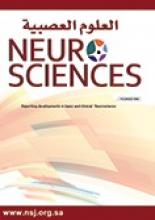Abstract
OBJECTIVE: To elucidate the differences between carotid angioplasty stent placement (CAS) and antidepressants on post-stroke depression (PSD) in high-grade carotid artery stenosis patients.
METHODS: In this prospective, controlled study, 182 cerebral ischemia stroke patients with high-grade carotid artery stenosis who were admitted to the Southwest Hospital of the Third Military Medical University, Chongqing, China, between April 2004 and March 2009 were enrolled. Based on different treatments, the patients were assigned to 2 groups: the CAS group (n=104), and the selective serotonin reuptake inhibitors (SSRIs) group (n=78). All patients were tested using the Hamilton Depression Rating Scale (HDRS) and the National Institutes of Health Stroke Scale (NIHSS) before treatment, one, and 3 months after treatment.
RESULTS: The NIHSS score of the CAS group was significantly decreased at one (p=0.007) and 3 months (p=0.006). At one month, the HDRS score of the CAS group was significantly lower than the SSRIs group (p=0.005), and there was no significant difference between these 2 groups at 3 months.
CONCLUSION: The CAS relieved PSD and improved neurologic rehabilitation in high-grade carotid artery stenosis patients, and the therapeutic effect was superior to that of SSRIs after one month.
- Copyright: © Neurosciences
Neurosciences is an Open Access journal and articles published are distributed under the terms of the Creative Commons Attribution-NonCommercial License (CC BY-NC). Readers may copy, distribute, and display the work for non-commercial purposes with the proper citation of the original work.






